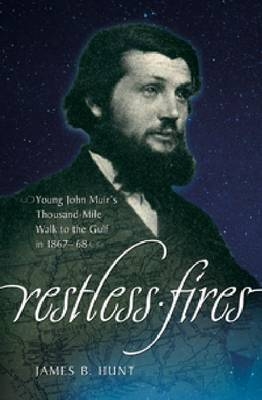
Restless Fires
Young John Muir's Thousand Mile Walk to the Gulf in 1867–68
Seiten
2012
Mercer University Press (Verlag)
978-0-88146-392-7 (ISBN)
Mercer University Press (Verlag)
978-0-88146-392-7 (ISBN)
Provides a detailed rendering of John Muir’s thousand-mile walk to the Gulf based on both manuscript and published accounts. It places his journey in the context of the Civil War and Reconstruction, to which Muir gave only passing witness. Through these experiences and reflections, Muir came to radical views regarding humankind’s relationship to nature, death, and faith.
Restless Fires provides a detailed rendering of John Muir’s thousand-mile walk to the Gulf based on both manuscript and published accounts. Hunt particularly examines the development of Muir’s environmental thought as a young adult. Muir experienced delight in seeing nature anew after recovering from partial blindness due to a factory accident. He witnessed the Civil War’s devastating impacts and efforts towards Reconstruction on towns, villages, and people.
This is one of the first books on John Muir’s thousand-mile walk that places his journey in the context of the Civil War and Reconstruction, to which Muir gave only passing witness. Through these experiences and reflections, Muir came to radical views regarding humankind’s relationship to nature, death, and faith. Muir suffered hunger, felt pangs of loneliness, slept five days in a cemetery, slogged through swamps, and nearly died of malaria.
The legacy of this walk is found in Muir’s perceptive insights generated in part by his background and reading, and by his experience with the Southern environment and its people and plants during the walk. His journal gives evidence of a young man resolving what he wants to do with his life. Muir comes to profound insights as to how human beings fit into nature. A walk in nature gave humans a sense of their limits, a lesson in humility. In Muir’s view, nature provides humans a moral touchstone when they recognize their small part in the “divine harmony.” Muir wrote that when he simply went out for a walk in nature, he was really “going in.” This book explores what Muir meant.
Restless Fires provides a detailed rendering of John Muir’s thousand-mile walk to the Gulf based on both manuscript and published accounts. Hunt particularly examines the development of Muir’s environmental thought as a young adult. Muir experienced delight in seeing nature anew after recovering from partial blindness due to a factory accident. He witnessed the Civil War’s devastating impacts and efforts towards Reconstruction on towns, villages, and people.
This is one of the first books on John Muir’s thousand-mile walk that places his journey in the context of the Civil War and Reconstruction, to which Muir gave only passing witness. Through these experiences and reflections, Muir came to radical views regarding humankind’s relationship to nature, death, and faith. Muir suffered hunger, felt pangs of loneliness, slept five days in a cemetery, slogged through swamps, and nearly died of malaria.
The legacy of this walk is found in Muir’s perceptive insights generated in part by his background and reading, and by his experience with the Southern environment and its people and plants during the walk. His journal gives evidence of a young man resolving what he wants to do with his life. Muir comes to profound insights as to how human beings fit into nature. A walk in nature gave humans a sense of their limits, a lesson in humility. In Muir’s view, nature provides humans a moral touchstone when they recognize their small part in the “divine harmony.” Muir wrote that when he simply went out for a walk in nature, he was really “going in.” This book explores what Muir meant.
James B. Hunt is professor emeritus of History at Whitworth University in Spokane, Washington, USA, and cofounder of the Krista Foundation for Global Citizenship. Hunt taught American, Latin American, and World history while at Whitworth. For twenty-five years, he provided faculty leadership to students travelling to Central America for Whitworth’s five months study/service programme. This led to his compelling interest and writing on the impact of youthful travel on such American leaders as John Quincy Adams, Frederick Douglass, Jane Addams, and John Muir
| Erscheint lt. Verlag | 30.11.2012 |
|---|---|
| Zusatzinfo | Illustrations, maps |
| Verlagsort | Georgia |
| Sprache | englisch |
| Themenwelt | Literatur ► Biografien / Erfahrungsberichte |
| Sachbuch/Ratgeber ► Natur / Technik ► Natur / Ökologie | |
| Sachbuch/Ratgeber ► Sport | |
| Reiseführer ► Nord- / Mittelamerika ► Karibik | |
| Reiseführer ► Nord- / Mittelamerika ► USA | |
| Naturwissenschaften ► Biologie ► Ökologie / Naturschutz | |
| ISBN-10 | 0-88146-392-2 / 0881463922 |
| ISBN-13 | 978-0-88146-392-7 / 9780881463927 |
| Zustand | Neuware |
| Haben Sie eine Frage zum Produkt? |
Mehr entdecken
aus dem Bereich
aus dem Bereich
Barbados, Trinidad & Tobago, Windward Island, Französische & …
Buch | Softcover (2024)
MAIRDUMONT (Verlag)
CHF 24,90
Buch | Softcover (2024)
MAIRDUMONT (Verlag)
CHF 24,90


